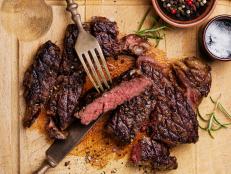Rice May Become Less Nutritious Thanks to Climate Change
A nutritionist explains what it means for you.

iko636
Even in America where we eat it less frequently than people do in a lot of other countries, rice is one of those foods we sometimes take for granted. We rely on it as a trusty side dish as well as a staple for those on a gluten-free diet.
So a recent study brings worrisome news: Rice may be getting less nutritious thanks to the effects of climate change.
According to research published in Sciences Advances, which measured the effects of rising levels of carbon dioxide in the atmosphere on a 18 different types of rice crops in a multi-year, multi-location study, elevated CO2 levels have been linked to declines in the content of protein, iron and zinc in rice, as well as a reduction in the level of vitamins B1, B2, B5 and B9. On the bright side, vitamin E was found to increase in response to higher levels of CO2. Given the dietary importance of rice for many populations around the globe, potential health risks associated with these CO2-prompted declines in protein, minerals and vitamins in rice could affect hundreds of millions of people, the study authors note.
To learn more about the healthfulness of rice in general and put the implications of the new research in context, Healthy Eats turned to Samantha Cassetty, MS, RD, a New York City nutritionist who was not involved in the study:
Should people think of rice as a healthy food, in general?
That depends. Whole grain varieties, like brown rice, forbidden black rice, sprouted brown rice and wild rice, are rich in nutrients and provide more fiber, vitamins and minerals than white rice. These whole grain rices have been linked with health improvements and can definitely be part of a deliciously healthy menu. On the other hand, I'd encourage people to limit white rice consumption, just as I'd suggesting limiting any refined grain.
What do you make of the recent study that determined that rice appears to be getting less nutritious due to rising atmospheric carbon dioxide concentration?
This study forecasts the environmental impact to our food supply and how that will alter nutrition. Certainly, for people who rely on rice as a staple in their diet — particularly people in Southeast Asia — this could have a dramatic effect on nutrition status. However, for the average American who eats protein from other sources and has a more varied diet, the impact wouldn't be as noticeable. To put this in perspective, in some places in Southeast Asia, people consume 50 percent of their calories from rice. But even in Japan, which has traditionally been a high rice-consuming country, the number is at 20 percent.
What effect do you think will this have on people around the world, nutritionally speaking?
The study is forecasting a dramatic nutritional impact for populations that depend on rice, however improvements in a country's economic development would lessen the impact because as that improves people tend to move toward a more varied diet with a greater intake of protein from other sources. Also, there may be improvements to our climate situation or innovations in farming practices that could help maintain rice's nutritional status, or there may be improvements in access to other foods. So a study like this helps spark thinking about the potential impact and the ways to modify it.
Should American consumers change their rice-eating habits in light of this study?
In the U.S., we're not relying on rice as the main source for many of these nutrients, such as protein and vitamin E. My main advice to consumers when it comes to rice is to swap white rice for whole grain varieties (like sprouted and regular brown rice and wild rice) whenever possible. You get much more nutrition from brown rice and other whole grain versions. And beyond that, it's important to vary your whole grains. For example, try quinoa, oats, millet, faro and buckwheat. Different foods provide different levels of vitamins, minerals, antioxidants, fiber, and other plant compounds so it's always a good idea to mix things up!
Is arsenic something people should be concerned about when eating rice?
I have concerns about arsenic in rice. Because of the way rice is grown, it absorbs more arsenic than other types of crops. For infants and small children, this is especially concerning. However, it's also an issue for people consuming gluten-free diets who rely on rice and rice flour, found in many gluten-free packaged foods, including breads, pretzels, crackers and pasta.
What can people do to make sure they’re safe?
To minimize exposure, make sure you're eating a variety of whole grains, including whole wheat (for those who don't need to restrict wheat-based foods), quinoa, oats, buckwheat, etc. Feed infants iron-fortified alternatives to rice cereal, such as oat cereal. Pregnant women should also use more caution. For most healthy adults, simply varying grains rather than over-relying on rice and rice-based foods would be a good way to go. There are also plenty of non-grain alternatives, like bean-based pasta or crackers made from almond or cassava flour, that are helpful for those following a gluten-free diet.
Related Links:

































